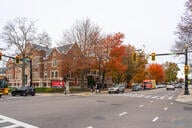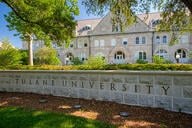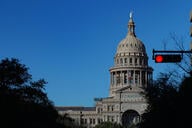You have /5 articles left.
Sign up for a free account or log in.

Rob Latham
U of California
In an extremely rare move, the University of California System Board of Regents last month fired a tenured faculty member -- over alleged violations of the university's sexual harassment and drug and alcohol use policies. While the exact details of the professor’s transgressions are confidential for now, the case has spilled over into the public sphere. Rob Latham, former professor of English at the system’s Riverside campus, says shared governance and his academic freedom have been violated and that he intends to sue, while some of his former colleagues are defending the university’s decision.
“This is a case in which the system worked,” Deborah Willis, the former chair of English at Riverside, said in an interview. “People are saying this is an attack on tenure, but I don’t think tenure should be used as a shield for faculty misconduct. That’s not what it was invented for.”
Willis’s comments echo a statement approved by Riverside's English department, saying, “We stand with our graduate students, and those who came forward, filed complaints and supported each other through this difficult process. We are committed to moving forward with our students, and to working together to repair any and all harm done to our community and to our campus.”
While members of the department said they wanted to move on from the Latham case out of the public eye, they said they were drawn into a back-and-forth with Latham last week after his comments to the Board of Regents were posted with his permission to the American Association of University Professors’ “Academe” blog. The post attracted significant attention because of Latham's claims related to academic freedom and shared governance and also due to his standing as a well-known scholar of science fiction.
Latham declined an interview or to provide documents related to his case, citing legal concerns, and his lawyer, Alec Rose, said it would be inappropriate to comment before he files a formal request for a judge to review the university’s decision. But in the comments he shared in “Academe,” Latham argues that irregularities of process, false claims and bias led to his dismissal.
A Public Appeal
“I can’t believe that this case, which began with false charges of sexual harassment brought by a disgruntled graduate student and his girlfriend, has been allowed to reach the Board of Regents,” he said, alleging that a comment he’d made about riding a graduate student “too hard” had been interpreted in a sexual way because Latham is gay. If a straight man had made such a comment, it would never had been questioned, he said.
Latham said the matter should have been mediated, but Riverside never attempted any such “good faith” effort. “I was never even invited to respond to the charges or to submit exculpatory evidence,” he said. “Instead, the administration adopted an adversarial posture from the outset, as if the original allegations -- the vast majority of which we now know to be untrue -- had already been proven.”
Regarding the drug-related charges, Latham said he’d made “a serious error of judgment in relation to substance abuse, for which I sought treatment one full year before any charges were filed against me. The [Academic] Senate, for whatever reason, gave me no credit for that effort at self-correction, and now [Riverside] Chancellor Kim Wilcox is asking you to dismiss me for the recurrence of a psychological illness.”
Latham said “political pressures and rank homophobia” had “deformed the disciplinary process, including acts of official misconduct that are currently being investigated by the senate.” Latham alleges that the graduate student union pressured Riverside’s administration to dismiss him by threatening to “go public” with students’ charges against him. Other irregularities include administrative manipulation and corruption of an investigation under Title IX of the Education Amendments of 1972, which prohibits gender-based discrimination, Latham said, along with coaching student witnesses and suppressing favorable evidence.
The graduate student union, which is affiliated with the United Auto Workers, said in a statement that it “has the responsibility to represent our members when we believe our contract has been violated, and to call on our employer, the University of California, to take appropriate steps to prevent continued violations and/or crimes against our members. We stand by those who came forward at Riverside, and we remain committed to ending sexual harassment and assault at all [university system] campuses.”
Latham said the Academic Senate's Hearing Committee of the Committee on Privilege and Tenure, which reviewed his case before it went to the board, found that the complainants’ sexual harassment charges hadn’t been proven to a clear and convincing standard.
“Here is the kind of language the committee uses to describe the students’ allegations: ‘not credible,’ ‘inconsistent with contemporaneous evidence,’ the full record ‘argues strongly against a finding of sexual harassment’; contrary to Complainant No. 1’s assertions that he found my communications unwelcome, ‘the evidence is that he enthusiastically participated in these exchanges’; and so on,” he said. “The administration could have -- and should have -- admitted the mendacity of their two protagonists early in this process, if they had been remotely concerned with justice or the truth. But that is not the path they chose to take.”
Dismissed by the Board
The University of California has fired only a handful of tenured professors since the late 1950s, when the system strengthened protections for faculty. The board voted in 2012 to dismiss Sarkis Joseph Khoury, a professor of finance at Riverside, for allegedly violating university policies against earning outside income while on sabbatical. But the move was largely symbolic, Khoury said in public statements, since he'd already resigned. In 2000, Sergio Stone, then a professor of medicine at the Irvine campus, was fired after being linked to a fertility clinic scandal there. A faculty panel recommended that he be demoted but the board -- which ultimately has authority in such cases -- moved to dismiss him. Saying the case against him was less serious than that against Stone, Latham asked the board to honor the sanction the faculty hearing committee recommended after reviewing his case: demotion in rank and two years of unpaid leave. (He still called that punishment disproportionate in relation to other system professors accused of similar acts of misconduct, citing Geoff Marcy, the former professor of astronomy at the system’s Berkeley campus who was found to have sexually harassed female students over many years. In that case, which came to light this fall, Marcy was warned not to repeat the behavior or risk dismissal going forward. He eventually stepped down amid public pressure, but Latham said Marcy had been treated differently because he was heterosexual, despite being a “predator.”)
Despite Latham's pleading, the regents voted Jan. 20 to dismiss him, 15 to 5. A memo released by the board gives no reason, but Rebecca Trounson, a spokesperson for the system’s office of the president, said the board had acted based on violations of the Faculty Code of Conduct, specifically its substance abuse and sexual harassment policies. She declined to provide additional details, citing confidentiality concerns.
More to the Story?
While the faculty hearing committee found the sexual harassment charges insufficiently supported by evidence, several professors and students familiar with the case against Latham said the charges against him went well beyond the details he’d shared in his statement. They also noted that the faculty hearing committee uses a “clear and convincing” standard of proof, which is higher than the preponderance of evidence standard used in Title IX investigations. (Latham addresses this in his statement, saying that not only did the hearing committee not find sufficient evidence, it found at least some allegations not credible.) These sources, who did not want to be named due to confidentiality and legal concerns, also said that Latham had been known to share and do drugs, specifically cocaine, with his graduate students. Latham's statement references one allegation of sharing drugs with graduate students, but he said he was “demonstrably not present” during the alleged incident.
Jose Wudka, professor of physics and chair of the Riverside division of the Academic Senate, referred questions about the hearing committee's role in the case to the university.
Regarding the sex discrimination-based claims, Latham via email reiterated that the Title IX investigation was procedurally flawed. He did not respond to the allegation of drug use.
Latham’s comments on “Academe” attracted many sympathetic comments, as well as expressions of support from former graduate students attesting to his strength as a mentor. Some of the posts came from students from his past job at the University of Iowa, where he was a professor until 2008, when Riverside hired him in part as a liaison to the massive Eaton Collection of Science Fiction and Fantasy.
But there were also some detractors, accusing Latham of being emotionally manipulative -- a charge that came up in the Title IX report.
Responding to that accusation via email, Latham said six of his current advisees offered testimony on his behalf at the hearing, “including forcefully rebutting claims of harassment brought by the complainants, and a dozen of my former advisees supplied letters.” One past advisee, Jeff Hicks -- now an instructor of liberal studies at California State University at Los Angeles -- said via email that he worked "very closely with Rob and a number of the students he was mentoring at the time of the charges against him, and I can say definitively that he never took advantage of his relationship as a mentor. Instead, he offered assistance and guidance to any graduate student who asked."
But another former mentee who did not want to be named, citing legal concerns, said in an interview that "One of the things people like about him is that he is very friendly with students, and I don't necessarily think that's a bad thing when there are boundaries, but he took it too far and took a lot of pleasure out of manipulating students emotionally."
Willis eventually weighed in on “Academe,” sharing the English department’s statement and saying that Latham had misrepresented her position in his comments.
“Rob takes my words out of context and gives the false impression that I was prevented from speaking on his behalf at the hearing,” Willis wrote. “It is true that I had a high regard for Rob’s teaching and scholarship before this case began, and I supported him in many ways while I was chair. I liked him as a person and as a colleague. However, by the time of the hearing, I had come to believe that Rob had profoundly betrayed my trust. In my opinion, Rob has harmed our students, damaged our program and betrayed his colleagues and friends.”
Willis said she was involved in Latham’s case from the beginning and believed that all university policies and processes were followed carefully. “Rob had every opportunity to tell his side of the story and advance his theory of the case. He thinks what he has done is trivial. It is not.”
Jennifer Doyle, another professor of English, said this “entire forum is treating our lives as click bait. It is Latham, and the AAUP, who had forced us onto this forum by publishing this document. For his victims, this forum is on a continuum with the harassment that has characterized the experience of working and studying with him -- just dragged out into the public sphere. We all want that harassment to stop.”
Similarly to Willis, Doyle added that “conversation about the necessary, important and principled defense of tenure should be staged as far from this case as possible.”
Latham, of course, disagrees. He said there are former colleagues and a number of graduate students at Riverside who are “invested in a false narrative of this case, because they refuse to believe that they were misled by the two complainants. But they were, and the full dimensions of the students' mendacity will only become clear once we file” a legal request for review.





